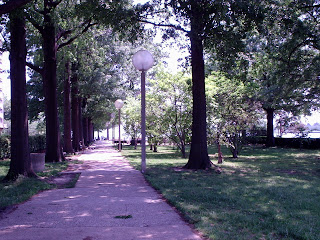 MP: Psalm 119:97-120; Baruch 3:24-37; James 5:13-18; Luke 12:22-31
MP: Psalm 119:97-120; Baruch 3:24-37; James 5:13-18; Luke 12:22-31EP: Psalm 68:1-20; 2Kings 2:1-15; Revelation 5:1-14
In the Gospel of Luke this morning, the day before Ascension Day, Jesus talks about our incessant worrying over unnecessary things. He uses some form of that word, worry, four times in 8 verses. Don't worry about clothing, and food. Don't worry about inconsequential things. For me there are two phrases that jump out at me in this morning's Gospel lesson:
- For life is more than food, and the body more than clothing.
- Strive for God's kingdom; and these things will be given to you as well.
I must confess: I do worry about what I wear, how I look, how people will perceive me from my attire and my body-type. I don't worry so much about food - I am particular about what I eat but I can go a remarkable amount of time without eating. But, then again, I have been blessed to never have been completely destitute and worried about not having any food with which to survive on. So my experience is narrow in that regard.
I also must confess that I enjoy watching the show Sex in the City. In fact, last night after work, I sat down and watched the movie version of the show on DVD. I was struck by the rampant materialism and how much fashion, clothes, hair style, body type, played a part in the characters' lives. One of the lines about living in NYC is: People come to NYC for Fun, Fashion and Love. A goodly portion of the movie (and the series) explores what friendship is and means, as well as the difference between sex and love and how they can be mistaken for one another and the ramifications from that confusion. It also has to do with very expensive fashion, from clothing, to shoes, to bags. And yet, even with all this focus on inconsequential aspects of life, the movie did focus on love and the real meaning of it. And my last confession of the morning is that the movie made me cry last night.
Even with all the worrying those characters went through, when they were able to let go of those concerns (intellectual, financial, material) and let love reign true, their lives became different and better than they were before. Striving for God's kingdom can be found in that love, in that trust in our deepest selves. In that trust that the love that God has for us and has planted at the very root of our being, can bring us to a place where the worrying over materialistic things can fade and the true meaning of what our lives should be focused on can come into clear focus.
jfd+
Copyright 2009, The Rev. John F. Dwyer. All Rights Reserved.
 Psalm 105:1-22 * 105:23-45; Ezekiel 18:1-4,19-32; Hebrews 7:18-28; Luke 10:25-37
Psalm 105:1-22 * 105:23-45; Ezekiel 18:1-4,19-32; Hebrews 7:18-28; Luke 10:25-37








